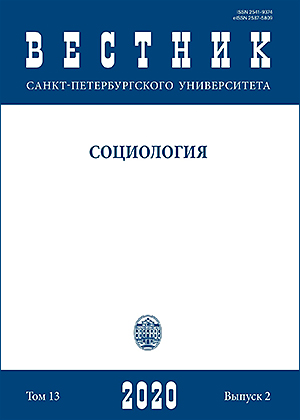Adaptation apartments as a mechanism for overcoming drug addiction (on the example of the experience of St. Petersburg)
DOI:
https://doi.org/10.21638/spbu12.2020.206Abstract
The paper discusses the experience of St. Petersburg in organizing counteraction to one of the most important factors of social disorganization — drug addiction. In recent years, this phenomenon has become widespread and has become the focus of attention of sociologists, social psychologists, physicians, and law enforcement officials. The main factors that provoke such a destruction of mass consciousness are the weakening of socializing mechanisms and social elevators, such as education, upbringing, ideology and a number of others, as well as the process of the world globalization increasing impact. Drugs as a criminal phenomenon and the situation with the spread of narcotic substances have a detrimental effect on various aspects of society: economic, social, psychological, medical, demographic. The significant influence of narcotism on certain stereotypes of youth subculture, such as leisure, slang, creativity, which
can talk about the destruction of the choice of behavioral norms is of particular concern. Explaining the causes, conditions and factors determining this social phenomenon has become an urgent task. It was determined that one of the factors in overcoming the damage from drug and alcohol consumption is an increase in the remission level, that means a steady sobriety of patients. It reaches 5 % in Russia, and 20 % in St. Petersburg. With the effective organization of
the rehabilitation process, this indicator can be raised over 35 %. An objective assessment and analysis of the interaction of the state and civil society represented by non-profit organizations in drug and alcohol consumers’ rehabilitation, in particular through the adaptation apartment mechanism, will make it possible to develop the most successful socially useful programs, which can help improve the drug situation in the region.
Keywords:
deviation, drug addiction, non-profit organizations (NPOs), civil society, state, government
Downloads
References
References
Downloads
Published
How to Cite
Issue
Section
License
Articles of "Vestnik of Saint Petersburg University. Sociology" are open access distributed under the terms of the License Agreement with Saint Petersburg State University, which permits to the authors unrestricted distribution and self-archiving free of charge.




